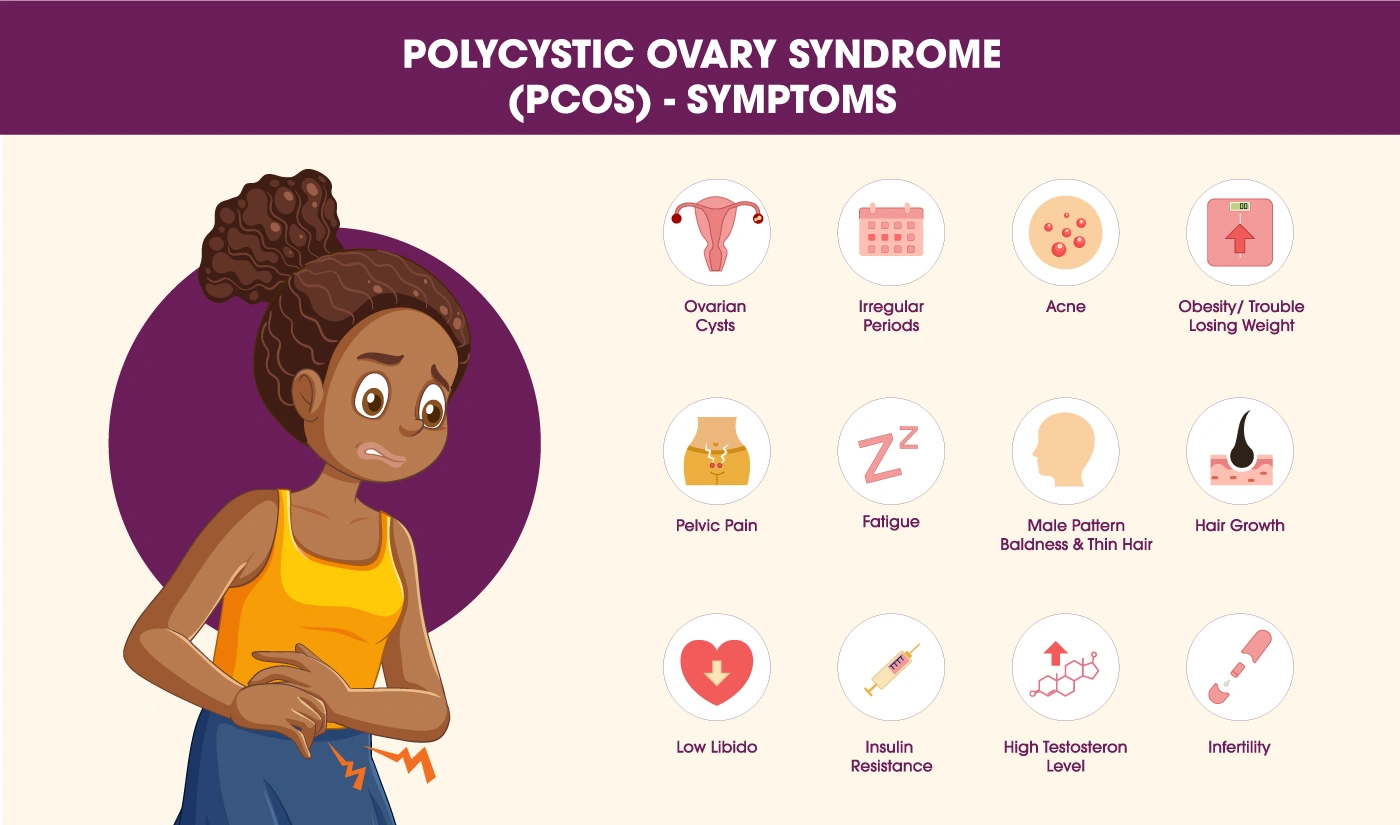PCOS (Polycystic Ovary Syndrome) is quite a common endocrine-spanning hormonal disorder that affects women in their reproductive age. As per various studies, around 8-13% of the entire population suffers from it (Source: WHO). But, many women remain unaware of the impact it often has on fertility.
Let’s begin with the frequently asked questions related to PCOS and fertility to create awareness.
What is Polycystic Ovary Syndrome PCOS?
PCOS (Polycystic Ovary Syndrome) is an endocrine disorder that usually causes problems with the normal functioning of the ovaries. It usually leads to an irregular menstrual cycle, higher levels of male hormones (androgens), and cysts filled with fluid on the ovaries. Such imbalances in hormones affect the ovulation cycle and, thus, fertility issues in PCOS arise.
Along with endocrine and reproductive characteristics, PCOS has its metabolic manifestations, such as insulin resistance with weight gain, predisposing women to an increased risk of type 2 diabetes. While the exact cause of PCOS remains unknown, it is likely caused by a combination of genetic and environmental factors.
Recognizing PCOS (Polycystic Ovary Syndrome) symptoms

Prompt diagnosis requires the detection of these symptoms:
- Irregular Menstrual Cycles: Women with PCOS may experience
- Irregular, or prolonged periods.
- Excessive Hair Growth (Hirsutism): Elevated levels of androgens often produce unwanted hair growth on the face, chest, back, and thighs.
- Acne and oily skin: Severe acne, particularly on the face and upper body, is yet another common symptom of PCOS.
- Gaining extra kilos: Unexplained weight gain and the inability to lose weight are more common.
- Thinning of hair: Hair loss or thinning on the scalp may occur, usually similar to male-pattern baldness.
- Patches of Darkened Skin: Skin darkening in the neck, groin, or under the breasts due to insulin resistance.
This early recognition enables prompt medical attention, thus affording a great chance to manage infertility and even the prevention of cardiovascular diseases.
PCOS (Polycystic Ovary Syndrome) and fertility: busting some myths
PCOS ranks highest among most causes of infertility in women. It creates hormonal disorders that disrupt ovulation, where the ovaries do not release a mature egg. If there is no ovulation, the possibility of getting pregnant becomes a challenge.
The fact reaffirms that PCOS (Polycystic Ovary Syndrome) does not mean infertility is inevitable. Many women with PCOS have been successful in conceiving after being given the right treatment and some lifestyle amendments. Even the early diagnosis of the condition PCOS followed by a proper treatment plan has considerably increased the likelihood of falling pregnant.
PCOS (Polycystic Ovary Syndrome) treatment options
Besides general supportive measures to regulate the symptoms and specific hormonal imbalances of PCOS, the mentioned treatment options have been viewed as the standard approaches:
- Keep a keen eye on ovulation: Use basal body temperature charts or ovulation predictor kits to closely monitor ovulation, to identify the fertile window.
- Eat well and keep away junk: Be more inclusive by adding whole foods, lean proteins, fat, and fiber-rich carbs to your diet. While minimizing processed foods and refined sugars as these will aggravate your insulin resistance.
- Regular workout: Light to moderate exercises will keep body weight normal and control insulin resistance.
- Timely visit to a specialist: Get a consultation with a fertility expert who would recommend customized treatment like ovulation induction or assisted reproductive technologies (ART).
- Stress management: Stressful situations affect fertility negatively. Stress relief techniques, such as yoga, meditation, and counselling, may help.
The long-term effect of PCOS on your health
It has far-reaching health implications apart from infertility. Without the right treatment, the risk of type 2 diabetes, high blood pressure, and diseases affecting the heart and blood vessels is greater. Combined with very irregular cycles, cancer of the endometrium can result from this condition.
Routine check-ups and proactive management helps stem these risks. Early detection and continuous care for women manifesting this syndrome is necessary.
Breaking the stigma: spreading more awareness about PCOS & Fertility
PCOS (Polycystic Ovary Syndrome) is grossly underdiagnosed and profoundly misunderstood. Nothing is more intrusive than the stigma against reproductive health issues that undermines women’s will to seek out medical treatment on time. Creating more awareness about PCOS aids to break the silence where women can take hold of their health.
Awareness campaigns, support groups, and educational initiatives ensure better care and support for all women with PCOS.
PCOS often feels overwhelming, especially when it affects fertility, but with the right steps, it’s manageable. Paying attention to the symptoms early and getting the right diagnosis can make a big difference. Simple lifestyle changes, paired with targeted treatments, can go a long way in improving your health. At Ferticity IVF & Fertility Clinics, our team of experienced fertility doctors offer advanced treatment and comprehensive care to all patients. If you’re planning a pregnancy with PCOS, book your consultation with our doctors.
- Lifestyle changes: Lifestyle changes are among the primary treatments for PCOS; the exercise program plus a low-calorie diet produced better results in ovulation and regulation of menstruation cycles. Even a 5-10% weight loss would improve hormone regulation.
- Medications: To manage PCOS, doctors often prescribe medications like oral contraceptives to regulate periods and control hormone levels, fertility drugs to help with ovulation, or metformin to improve insulin sensitivity. While these can be effective, it’s important not to self-medicate, as the wrong approach could lead to unwanted side effects. Always consult a doctor to find what’s best for your body.
- Surgery: In case of a failed medicinal treatment, doctors recommend a laparoscopic ovarian drilling procedure to induce ovulation.
- Assisted reproductive technology (ART): For some women struggling to conceive, intrauterine insemination (IUI) or in vitro fertilization (IVF) may offer hope. The success rate of women with PCOS generally has a favorable prognosis, given appropriate medical management and counselling.
PCOS pregnancy best practices
Being informed and taking an active stance can increase the chances of a successful pregnancy for women with PCOS (Polycystic Ovary Syndrome).
- Keep a keen eye on ovulation: Use basal body temperature charts or ovulation predictor kits to closely monitor ovulation, to identify the fertile window.
- Eat well and keep away junk: Be more inclusive by adding whole foods, lean proteins, fat, and fiber-rich carbs to your diet. While minimizing processed foods and refined sugars as these will aggravate your insulin resistance.
- Regular workout: Light to moderate exercises will keep body weight normal and control insulin resistance.
- Timely visit to a specialist: Get a consultation with a fertility expert who would recommend customized treatment like ovulation induction or assisted reproductive technologies (ART).
- Stress management: Stressful situations affect fertility negatively. Stress relief techniques, such as yoga, meditation, and counselling, may help.
The long-term effect of PCOS on your health
It has far-reaching health implications apart from infertility. Without the right treatment, the risk of type 2 diabetes, high blood pressure, and diseases affecting the heart and blood vessels is greater. Combined with very irregular cycles, cancer of the endometrium can result from this condition.
Routine check-ups and proactive management helps stem these risks. Early detection and continuous care for women manifesting this syndrome is necessary.
Breaking the stigma: spreading more awareness about PCOS & Fertility
PCOS (Polycystic Ovary Syndrome) is grossly underdiagnosed and profoundly misunderstood. Nothing is more intrusive than the stigma against reproductive health issues that undermines women’s will to seek out medical treatment on time. Creating more awareness about PCOS aids to break the silence where women can take hold of their health.
Awareness campaigns, support groups, and educational initiatives ensure better care and support for all women with PCOS.
PCOS often feels overwhelming, especially when it affects fertility, but with the right steps, it’s manageable. Paying attention to the symptoms early and getting the right diagnosis can make a big difference. Simple lifestyle changes, paired with targeted treatments, can go a long way in improving your health. At Ferticity IVF & Fertility Clinics, our team of experienced fertility doctors offer advanced treatment and comprehensive care to all patients. If you’re planning a pregnancy with PCOS, book your consultation with our doctors.

